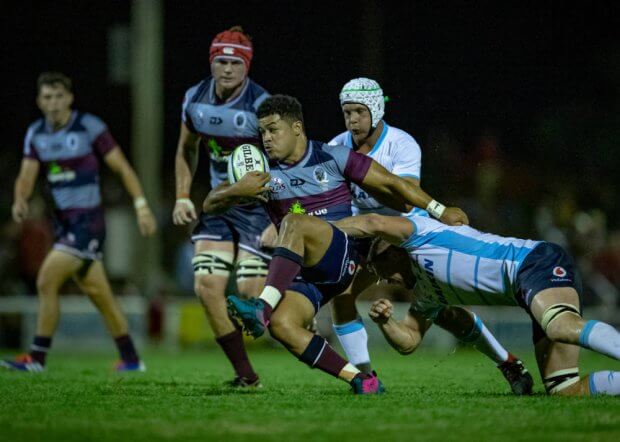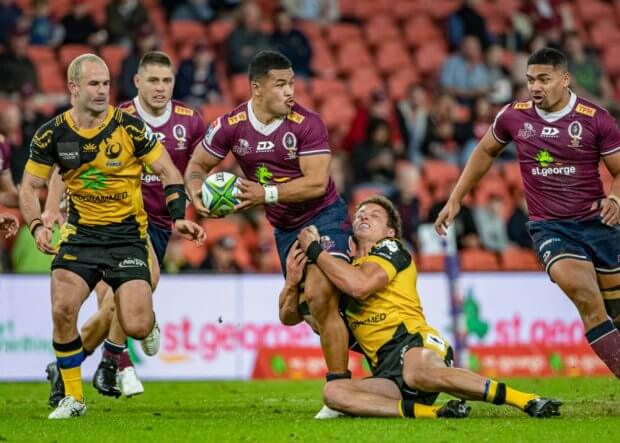Hot off the back of last week’s news winning “Best GAGR News of the Week” with daylight second – today’s rugby news sees Melbourne Rebels’ Super W players getting paid (eventually), Hunter Paisami re-signing for the Reds, the wicked problem of rugby collisions and Stan Sport turning Japanese (I really think so).
Rebels Super W payment deal in the works
Embed from Getty ImagesESPN has given an interim update on the Melbourne Rebels’ plan to actually pay their Super W players. Melbourne CEO Baden Stephenson has told ESPN the administration has yet to determine what player contracts will look like and how much the players will receive.
“It’s certainly the first step and it would only be part-time contracts, the Super W season is only a reasonably short competition in February-March so it’s a small window.”
Even so, the Rebels’ intent to pay their players is the first step in bridging the gap to professionalism and is a clear sign of the growth women’s rugby has had in Victoria.
Just five years ago, before the Super W tournament was developed, Rebels players such as Georgia Cormick were forced to fundraise thousands of dollars each season to cover travel expenses and kit, and they also had to take time off work in order to play in the old national championship.
“I’ve been involved with the Rebels since its inaugural season and also before that, back in our nationals days where we had to fundraise,” Cormick told ESPN. “I’ve seen it from the very beginning having to fundraise, you know, over a grand each time we went away to be able to pay for our kit and our flights and accommodation and all that kind of thing.”
At this stage no other Super W franchise has made the decision to follow the Rebels lead and appear to be wattled by a wabble of wowdy webels.
NSW Rugby – whose Waratahs are the four-time Super W champions – told ESPN it will continue to facilitate fundraising initiatives to help contribute to the women’s program.
A Brumbies spokesperson told ESPN they fully support the Rebels initiative and hope to be in a position to remunerate their players soon.
Both Queensland Rugby and the Western Force were also contacted for comment. The former was probably too busy delivering toys to the local orphanage or something while the Force are really testing our collective patience with their silence after being allowed back in to the East Coast’s Super Rugby.
Hunter for Reds (until) October (2023)
This pun headline bullshit is harder than it looks.

GAGR’s own Nathan Williamson reports that Wallabies centre Hunter Paisami has re-signed with the Queensland Reds and Rugby Australia until the end of 2023.
Since his Reds debut in 2020, Paisami has established himself as a mainstay of Queensland’s backline, helping them to a Super Rugby AU title in 2021 despite missing the Final due to a facial fracture.
He has continued this form into the international stage, featuring in nine of the Wallabies Tests in 2021.
The 23-year-old was eager to re-sign as he looks to build off his 15 appearances in gold ahead of the 2023 Rugby World Cup.
“It’s an honour to have re-signed with the Reds and Australian Rugby,” Paisami said in a statement.
“I’m really excited to be a part of this team and where this team can go in the future.”
“I’ve really enjoyed my time in Queensland so far and I’m really happy to stay here with my young family for at least the next two years.”
Wallabies coach Dave Rennie commented “He’s a good young man with an impressive skill set who’s only going to improve and that’s really exciting for Reds and Wallabies supporters.”
“His brutal defence and incisive carries were a feature on the end of year tour where he played his best footy in Wallaby gold.”
The wicked problem of a collision sport
Embed from Getty ImagesGuardian and Observer writer Michael Aylwin has written a piece about the challenges facing rugby. Extracts are pasted below:
A year ago last week, rugby was thrown into turmoil. Steve Thompson, a 2003 World Cup winner, announced that he and seven other former players were launching a lawsuit against World Rugby, the Rugby Football Union and the Welsh Rugby Union, after their diagnoses of dementia or, in the case of the 31-year-old Adam Hughes, post-concussion syndrome. The players with dementia were all in their early 40s.
The eight have since been joined by another 150, drawn from the same generation, with a further 75 from rugby league. Fifty more, and counting, wait in the wings weighing up their options. Of the 150, half have been diagnosed, the other half have been tested and await results, but all report similar unnerving symptoms.
For anyone in their 30s or early 40s, the odds of such a diagnosis are around one in 10,000. The 75 diagnosed already represent roughly one in 20 of those who played rugby union in England or Wales during the first 15 years of the professional era.
With every study the hypothesis firms up that it is not the arbitrary syndrome known as concussion that is the key factor in one’s risk of developing neurodegenerative disease in later life.
Neuroscience is now virtually certain the decisive variable is the sheer number of blows taken over a long career, otherwise known in the field as “cumulative dose”.
What no tweak to the laws has ever achieved – and realistically ever could – is to reduce significantly the number of collisions per match in the modern game, or even just to stop its escalation as the fitness and power of players increases year after year, despite the plateau in their size that was reached circa 2010.
A reduction of the blows suffered outside match day is an area for exploration. World Rugby has issued a recommendation that teams restrict contact training to at most 15 minutes a week.
Which brings us to the dread question of the number of games. Play fewer games, take fewer blows. The equation is simple. Harder to negotiate is the relationship between reducing games and keeping the sport afloat financially.
There is barely an institution in rugby that is not haemorrhaging money as things are. The only way they could begin to countenance losing fixtures or increasing squad sizes would be to cut back on player pay. The irony is that the very danger to which players are exposing themselves for our entertainment makes such a policy anathema to any right-thinking observer. Watch the players’ forebears go down with terminal conditions, then dock their pay.
You cannot repeatedly collide with other people without repeatedly jolting your head. A year on, rugby is nowhere nearer solving this conundrum than any of the rest of them.
Stan Sport secures rights to Japan’s League One rugby competition
Embed from Getty ImagesNathan “true blue” Williamson and Channel 9 separately report that Stan Sport will be the exclusive broadcaster of Japan’s premier rugby competition, now known as the Japan Rugby League One (why “League” FFS? but anyway…).
Kicking off on 7 January 2022, the inaugural season will see teams in Division One play the five other teams in their conference twice in a home and away format, along with six teams outside their conference. Stan Sport’s coverage begins with the Sungoliath vs Brave Lupus clash on January 8 and will feature two games live and ad-free each round.
JAPAN RUGBY LEAGUE ONE TEAMS AND NOTABLE PLAYERS
Black Rams Tokyo: Isaac Lucas (AUS), Matt Lucas (AUS), Joe Tomane (AUS)
Green Rockets Tokatsu: Blake Ferguson (AUS), Gehamat Shibasaki (AUS), Tom Marshall (NZL). [Director of rugby Michael Cheika – I can’t wait to see their on-field tactic]
Kobelco Kobe Steelers: Aaron Cruden (NZL), Ben Smith (NZL), Tom Franklin (NZL)
Kubota Spears Funabashi Tokyo Bay: Bernard Foley (AUS), Malcolm Marx (RSA), Ryan Crotty (NZL)
NTT DoCoMo Red Hurricanes Osaka: Elton Jantjies (RSA), Tyler Paul (RSA), Wimpie van der Walt (JPN)
Saitama Wild Knights: George Kruis (ENG), Marika Koroibete (AUS), Semisi Tupou (AUS)
Shining Arcs Tokyo-Bay Uraysu: Israel Folau (AUS), Greig Laidlaw (SCO), Liam Gill (AUS)
Shizuoka Blue Revs: Isi Naisarani (AUS), James Dargaville (AUS), Kwagga Smith (RSA)
Tokyo Suntory Sungoliath: Damian McKenzie (NZL), Samu Kerevi (AUS), Sean McMahon (AUS)
Toshiba Brave Lupus Tokyo: Michael Leitch (JPN), Matt Todd (NZ), Seta Tamanivalu (NZL)
Toyota Verblitz: Patrick Tuipulotu (NZ), Pieter-Steph du Toit (RSA), Willie le Roux (RSA)
Yokohama Canon Eagles: Amanaki Mafi (JPN), Jesse Kriel (RSA), Yu Tamura (JPN)
Kurita Water Gush Akishima: Ned Hanigan (AUS), Andrew Deegan (AUS), Tom English (AUS)

